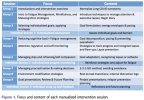Preliminary evaluation of a cognitive rehabilitation intervention for post-COVID-19 cognitive impairment: A pilot randomized controlled trial
Jacqueline H. Becker, Eric Watson, Nadia Zubair, Fernando Carnavali, Emilia Bagiella, David Reich, Juan P. Wisnivesky
Background:
Despite the profound impact of “brain fog” and/or cognitive impairment in relatively young people with Long COVID, no interventions with demonstrated efficacy are currently available. We conducted a pilot randomized controlled trial investigating the preliminary outcomes of a cognitive rehabilitation (CR) intervention adapted for persons with post-COVID cognitive impairment.
Methods:
Participants were ≥18 years of age, English-speaking, had history of SARS-CoV-2, and had cognitive impairment on objective measures. Eligible participants were randomized to a 12-week CR intervention or a time – and attention-matched control arm. Objective and subjective cognitive functioning was assessed at pre – and within 2-weeks post-intervention, utilizing validated neuropsychological measures across multiple domains. We compared pre vs. post intervention changes in cognitive scores in intervention vs. control groups.
Results:
The mean change in the intervention group compared to the controls in measures of processing speed, learning, memory, language, and of executive function did not reach the threshold for futility. In comparison to controls, the intervention group self-reported significant improvements in cognitive functioning.
Conclusions:
We found that an adapted CR intervention for Long COVID may improve post-COVID cognitive impairment in comparison to a time – and attention-matched control group and should be evaluated in a larger trial.
Web | Neuropsychological Rehabilitation | Paywall
Jacqueline H. Becker, Eric Watson, Nadia Zubair, Fernando Carnavali, Emilia Bagiella, David Reich, Juan P. Wisnivesky
Background:
Despite the profound impact of “brain fog” and/or cognitive impairment in relatively young people with Long COVID, no interventions with demonstrated efficacy are currently available. We conducted a pilot randomized controlled trial investigating the preliminary outcomes of a cognitive rehabilitation (CR) intervention adapted for persons with post-COVID cognitive impairment.
Methods:
Participants were ≥18 years of age, English-speaking, had history of SARS-CoV-2, and had cognitive impairment on objective measures. Eligible participants were randomized to a 12-week CR intervention or a time – and attention-matched control arm. Objective and subjective cognitive functioning was assessed at pre – and within 2-weeks post-intervention, utilizing validated neuropsychological measures across multiple domains. We compared pre vs. post intervention changes in cognitive scores in intervention vs. control groups.
Results:
The mean change in the intervention group compared to the controls in measures of processing speed, learning, memory, language, and of executive function did not reach the threshold for futility. In comparison to controls, the intervention group self-reported significant improvements in cognitive functioning.
Conclusions:
We found that an adapted CR intervention for Long COVID may improve post-COVID cognitive impairment in comparison to a time – and attention-matched control group and should be evaluated in a larger trial.
Web | Neuropsychological Rehabilitation | Paywall

